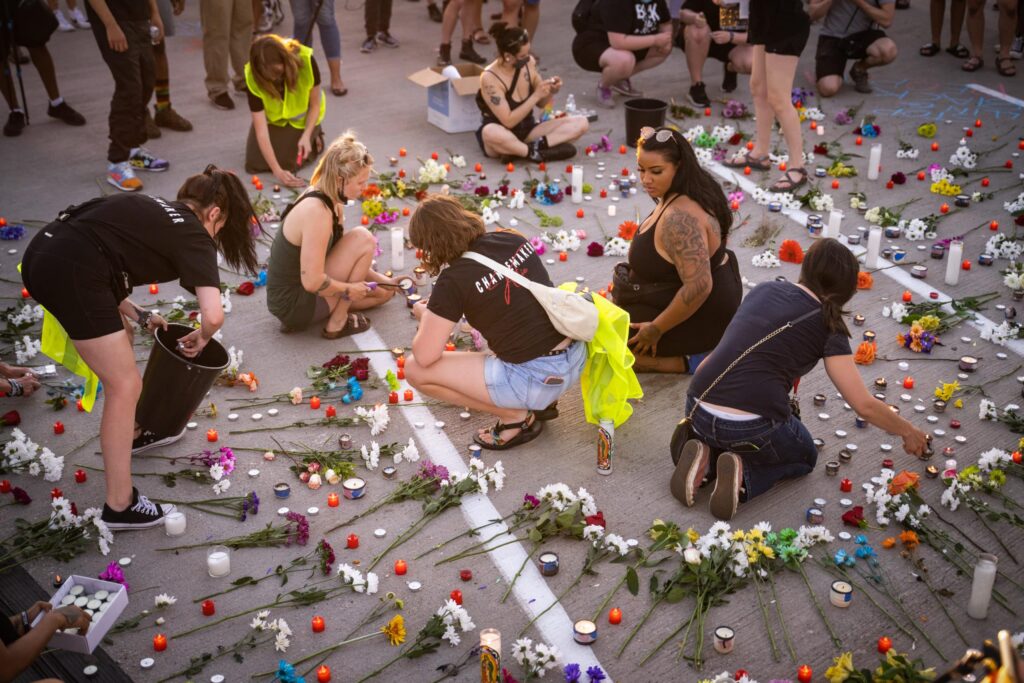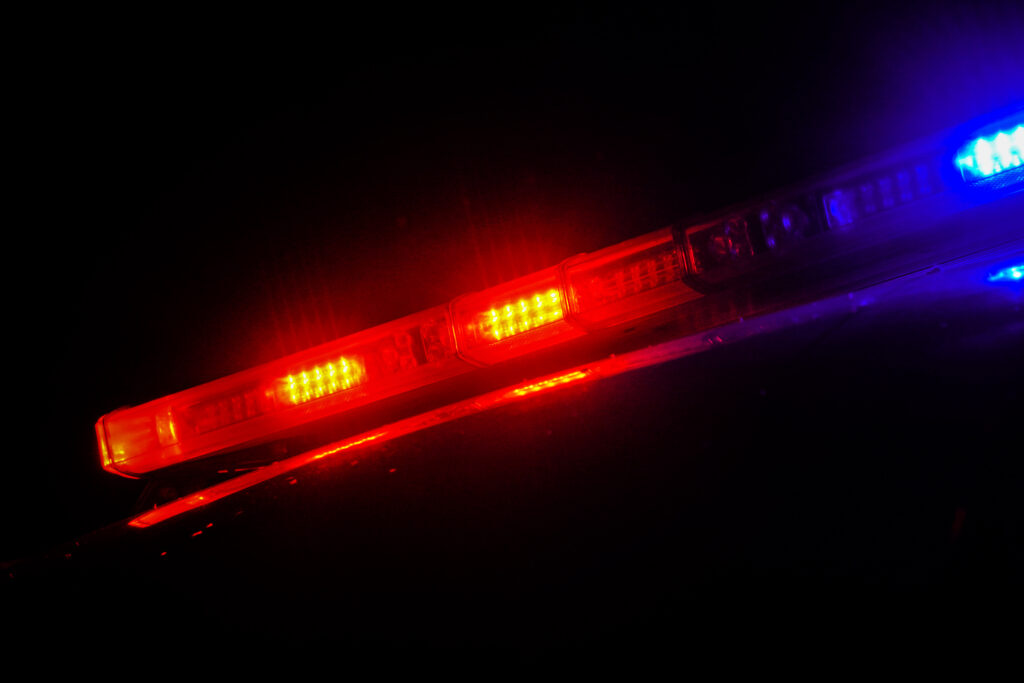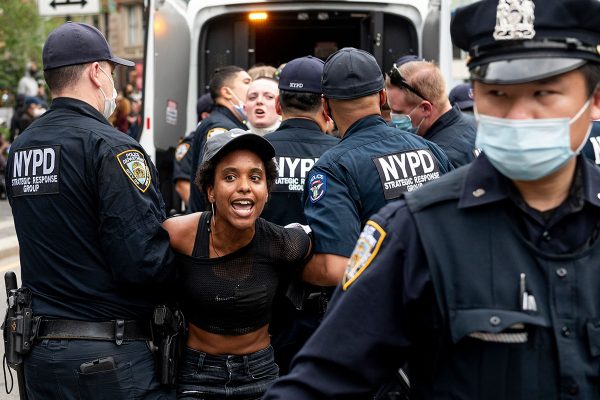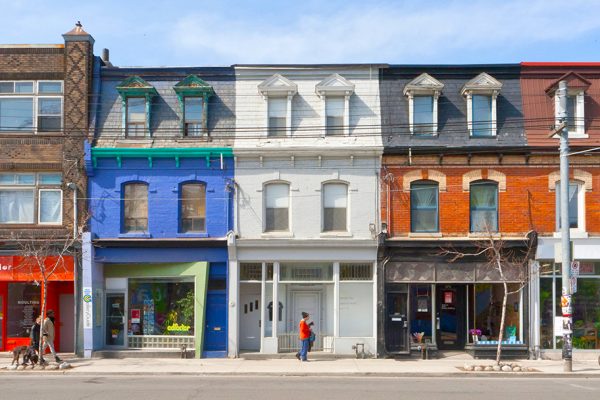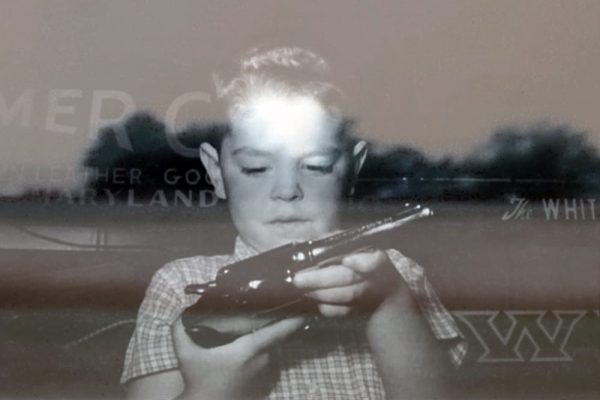What does justice look like in the aftermath of police violence? For many Americans, their vision of justice looks like accountability: police officers who kill Black people, indiscriminately and without cause, should be held accountable by the legal system, same as anyone. Our culture and institutions reinforce this view. Justice, we’re told, is a matter for lawyers, courts, and juries; it demands equal treatment under the law. And so when police have murdered Black civilians, those seeking justice have by and large turned expectantly to the criminal legal system. We have called for arrests and convictions. We have followed the trials with bated breath because the outcomes are our collective measure of whether Black lives really matter.
But something changed in 2020 when the idea of police abolition broke into the mainstream. Modern-day abolition, which traces its political roots to the abolition of slavery, rejects prisons and police as solutions to violence and aims to create safety through investments in social goods, such as education, housing, and health care—all necessary ingredients for reducing the likelihood of harm. The mainstreaming of abolition has supplied popular culture with a new set of questions about what might constitute justice. What if justice isn’t conferred by a court but created by building healthy, resourced communities? What if violence and harm are born of violent conditions and built into the institutions that claim to keep us safe? What if we weren’t satisfied with convictions after death and instead sought justice for the living?
These are just a few of the questions at the heart of Derecka Purnell’s book Becoming Abolitionists: Police, Protests and the Pursuit of Freedom. To Purnell—a social movement lawyer, writer, and organizer—abolition is not a utopia or an ideal but a practice. This vision of abolition seeks to understand the material needs that trigger police involvement and then build an ecosystem of support that interrupts the need for policing, in part by offering a more diverse range of options and responses to harm. Far from avoiding the tough questions, Purnell dives in headfirst. Drawing from history, she deftly connects the roots of violence to the racial and economic hierarchies police are charged with maintaining, arguing that precarity cannot be eradicated by the people who are paid to protect it. Becoming Abolitionists is ultimately about the importance of asking questions and our ability to create answers. And in the end, Purnell makes it clear that abolition is a labor of love—one that we can accomplish together if only we decide to.
Nia T. Evans: Becoming Abolitionists is an invitation to a new way of thinking about liberation, to join a growing freedom movement, and to witness your journey. And you really go on a journey in this book, from being a high school student in the Youth Crime Watch of America, to being someone who called for police convictions after the murders of Trayvon Martin and Michael Brown, to now fighting for an abolitionist future. What inspired you to write the book and document your journey?
Derecka Purnell: I didn’t anticipate writing the book the way I ended up writing it. I had a lot of conversations with scholars and organizers who were doing abolitionist work, and I laid out all these questions. I thought I was going to go into a PhD program and find answers. And I was very happy to be discouraged from doing that by Robin D. G. Kelley, Keeanga-Yamahtta Taylor, and Ruth Wilson Gilmore, who all told me I didn’t need to go into a PhD program to find answers for our liberation—that we can figure out on our own, for ourselves, those answers.
The book became an expansion of an article I wrote last year called “How I Became a Police Abolitionist.” That article made me realize the best way to talk to people who are curious about abolition is to discuss how I became an abolitionist. I wanted to write something that said, look, I get it. Policing is a very normal fixture of society. I relied on police. They were a huge part of my childhood, and even early adulthood. And I can understand that abolition may seem scary. I understand that some people hear abolition and just think that means police absence, or that we don’t care about violence or survivors. I wanted to show that many of the people fighting for an abolitionist world are survivors of violence themselves. Many of us live in neighborhoods and communities that are plagued with different kinds of violence, including police violence. And we have tried working within the system for change, and found that it’s impossible. So I started asking myself questions about my earliest thoughts and ideas around police. How did they form? Where did they come from? How did they change?
NE: Your point about police as fixtures, that they feel like unmovable parts of our society, is so important. Your book really exposes the U.S. love affair with policing. Every time there’s an economic or social crisis, we’re told police are the solution. Immigration crisis? We need border police and enforcement. Global pandemic? We give cops millions of dollars to enforce public health orders. Kids are struggling in school? Well, let’s throw some police in there. Where does that impulse come from? And what are the ramifications?
DP: Part of the impulse is not just the U.S. love affair with police, but the U.S. love affair with capitalism, which obviously produces inequality. If you’ve committed to maintaining oppressive systems so that very few people can benefit and thrive, then you use police to manage all the people who are excluded from those systems. Police become a cheap way of responding to all the crises you just created. Instead of having robust immigration ideas or working toward a global economy that doesn’t rely on the forced displacement of people, it’s much cheaper to pay for people to patrol the border. We don’t want to deal with global capitalism, so we manage a global capitalist crisis by just hiring more border police. The same is true with schools. Instead of investing in the type of neighborhoods where families and children can thrive with dignity and agency, we put “school resource officers” (police officers) in schools. And instead of paying for counselors and investing in athletic programs, we’ll just do a police athletic league, so cops can be counselors, and cops can be boxing coaches, and cops can be mentors. It becomes a cheap catchall way to respond to the crises in our community.
And even more insidiously, police serve as a jobs program. We have all of this inequality, and instead of undermining the inequality, we say, look, you can become a part of the system that manages it. And isn’t it better to become a cop and get a salary and earn a spot in the middle class, rather than ending up in prison or in the grave like so many people in your neighborhood? It’s the same with the military. It’s presented as an option for how to escape the crises that capitalism, racism, homophobia, and ableism create. So it’s an escape route and a jobs program.
NE: As you say, policing is a symptom of the violence enacted by capitalism, patriarchy, colonialism, homophobia, all these oppressive systems. So it’s impossible to understand policing without knowing how these histories intersect. Becoming Abolitionists takes us through that history—from slave patrols in the eighteenth century to South Carolina adopting some of the earliest forms of policing based on lessons learned from oppressing enslaved people in the Caribbean. We typically only grapple with policing in the U.S. context but you work to show this is a global struggle. That empires and nations have always shared knowledge about how to police, control, and surveil Black people. Can you tell me why the history is so critical to understanding policing right now?
DP: A lot of the history written about modern-day policing traces it back to slave patrols. This narrative concludes that police are bad because they arose from the violent enforcement of slavery. But the more I started to think about the history of policing, the more that I realized that it’s not enough to suggest that police started from slave patrols, or—another popular historical narrative—that they were a U.S. adoption of UK bobbies.
Rather, I argue that the history of policing starts with the freedom, and then subsequent repression, of Black people, poor people, and colonized people. Capitalists and people who were interested in maintaining empire created police to oppress people, to colonize them, to enslave them. Which means the history of policing starts with freedom and then resistance to oppression. Because if people didn’t resist oppression from empires, slave owners, and capitalists, then you wouldn’t need to create a police force to manage them. You wouldn’t need to create a police force to capture people who ran away or to create informants to figure out their secret plans for rebellion.
I found it interesting that the history of our resistance was so muted in this history when so much of the formation of police was in response to our resistance. Why did they need cuffs, chains, and cages? Or a system of surveillance and patrols? Well, they were looking for people who were resisting, and that history of resistance is equally if not more important than just the formation of police itself. Look at all the people who were enslaved and sharing information about rebellions—in South Carolina, Barbados, Louisiana, Haiti. There were deep legacies of solidarity across borders. That resistance informed how police had to respond to that community-based resistance and insurgent work that was happening.
NE: Yes, there’s something in there that flips the agency and the frame, that it didn’t just start with slavery or subjugation. It started with our freedom. It started with our resistance, and there needing to be a state-led response to that resistance.
DP: Absolutely, yes.
NE: That’s huge. I love that “freedom” is in the title of your book because abolition and freedom and liberation all reinforce each other. And you grapple with what freedom and safety looks like in this book, specifically for Black people. You challenge the idea that police, private property, and capitalism will make us free. There’s a part where you write, “I didn’t want what white people had to be the basis of our liberation. White people weren’t even free. They were bound to rotten fruits of slavery, colonialism, and genocide.” What does freedom and liberation look like in the context of abolition?
DP: In one sense, freedom and liberation in an abolition context is the dismantling of the prison-industrial complex—the system of police, prisons, prosecutors, and surveillance that adds so much more oppression to the violence that we face every day. Being free from those systems and eliminating the reasons why people think that we need those systems moves us closer to liberation. Freedom is also experimenting with creating the kinds of worlds that we choose for ourselves. Police are a default answer because many of us don’t have agency, time, imagination, or political will to build alternative ways of being a community. Freedom is a decision and a political commitment to building that—to deciding what we want instead of defaulting to the oppressive institutions we’ve been given.
Black political thinkers been making these arguments for generations—from Angela Davis to Ruth Wilson Gilmore to Mariame Kaba, all the way back to W. E. B. Du Bois. And for people who are fighting for or defending the traditions of abolition, it’s not just about abolition alone. It’s also fighting racism, homophobia, ableism. It’s fighting for a world that’s not rapidly heating because of industrial capitalism. We’ve got to ask: How do we fight what we’re up against? I love the way Amanda Alexander, founding executive director of the Detroit Justice Center, frames it. She asks: “How do we do offense, defense, and dream?” How do we play defense against these systems that oppress us? How do we play offense and actively attack them? And, finally, how do we dream? How do we figure out new ways that we want to be in relationship with each other?
In the beginning of Robin D. G. Kelley’s Freedom Dreams (2002), he issues a challenge that activists of my generation want to destroy and dismantle oppression, but have not given much thought to what they want to build. The book goes on to talk about artists, poets, organizers, musicians, communists, and socialists who have imagined a world they want to build that is different from the one that they inherited. Freedom is deciding to build that world, asking questions about what it is, and then reevaluating if what you did was right. It’s taking the time to say, you know, we tried to do this thing. Did it work? Maybe. Will it work again? Maybe. Can we do something better? Yes. Let’s try. It’s an iterative process to keep going back to the drawing board and to figure out what’s going to help this generation move forward.
NE: I love the idea that abolition is a commitment to experimenting and trying new things. It’s not about having all the answers. In the book’s opening chapter, you write, “If abolitionists had waited to convince every single person that freedom was worth the pursuit, Black people might still be on plantations. Slavery’s violence and repression was riskier than Black people’s plans, imagination, and will to be free. So they held the uncertainty in the bellies and started planning. Some started running.” That’s such an affecting and relevant point. It strikes me as exciting but also hard—holding uncertainty while moving toward freedom.
DP: What’s exciting is the refusal to accept repressive institutions. Many of the people who were able to run didn’t know what was on the other side. It was enough to know that freedom could be on the other side and that what they had in front of them was wrong and worth rejecting. But we also know not everyone could physically run. There were many people who remained on plantations simply because they could not run, or they were too old, or they were children. Fortunately, there were often people who tried to make sure that people didn’t get left behind. They carried each other, built wagons, and found new ways to hide and protect one another from people who were bringing them harm. And after the Civil War, people who ran went back and liberated those left behind on plantations and in jails. So we have a tradition of people who fought to make sure everyone got free, not just those who could physically run. We need to learn from them today.
One of the hardest aspects of abolition, then as now, is not having a clear timeline. People want certainty. For those who were escaping the plantations, they didn’t know how much longer slavery was going to last. They didn’t know if the abolitionists on their side would change their minds or get tired and burnt out. They had to act with the very limited information they had. We’re in a position now where we can try to help create a timeline. Conversely, if we all don’t do our part, we’re going to delay the possibility of total abolition. But if we all do our part, if we continue to ask questions, to be curious, to experiment, to love, to study, to struggle, we can get there. That’s very exciting—to be the ones fighting to end these oppressive institutions and making it easier for people to fight now and in the future.
NE: I want to talk a bit about your ideas around justice. In the aftermath of police killings, there are often calls for convictions of police. But in Becoming Abolitionists, you argue that we can’t secure justice for the dead. You write: “Justice is a process where people decide to create the conditions that will help us all thrive, and it involves the people most impacted by those conditions. The dead cannot participate in this process. We can demand a lot of outcomes, punishment, revenge, release, relief, but not justice.” Can you say more about what justice looks like to you in the aftermath of police killings?
DP: Let me underline a point I make in the passage you just read: there’s no justice for the dead. What happens with the dead is that they become the rallying cry for what should happen for the living. For people such as Trayvon Martin and Michael Brown, the living decide what justice is for them; they are no longer capable of deciding what justice would look like for themselves. Too often, when someone is murdered by the state, justice gets conflated with a conviction. That’s the thing that we think we can win. We measure justice based on the current system that we have. To me, justice is removing the capacity for police to kill and continue to harm people in that community. To get there, we need to reduce funding for police, initiate hiring and budget freezes, and reduce encounters with police. That brings us closer to community-based justice—justice not just for the dead, but also for the living.
We need to start asking what communities need in the wake of police violence. Usually, the focus is on what police need. We say police need training, more diversity, a consent decree, or body cameras. No, what we need to know is what the community needs. How do you make sure the families of police victims have resources? People who are murdered by police are often the breadwinners for their children, partners, and parents. How are we accommodating the needs of that family? How are we accommodating the needs of that community? It’s taking the time to be responsive, to organize.
NE: One of my favorite things about your book is how many thinkers, scholars, and organizers it is in dialogue with. Abolition feels like a conversation across generations. You make it clear that we are not out here floating without anchors, that there are deep and rich traditions for us to draw on. Why is political education so critical to the work of abolition?
DP: I didn’t know what political education was until I was in law school. I remember meeting Robin D. G. Kelley and he kept talking about political education, and I was like, where do I go get it? What should I read for my political education? And he said, I can’t tell you what you need for your political education. You’ve got to decide what it is with the people you’re organizing with. And then I went to South Africa, and I watched students there engaging in political education. I watched them read different texts and use those texts to inform the demands that they were making against their schools and country. They were so passionate, and so committed to deciding how they would situate the work they were doing, asking: Are we an ANC tradition? Are we a Biko tradition? Are we a Mandela tradition? What’s the legacy that’s informing the work that we’re doing?
When I returned to organizing at Harvard Law School—where we were, among other demands, trying to get the school to repudiate its founding by the Royall family, which made its fortune off of Caribbean slavery—what I had witnessed in South Africa brought up a new set of questions. How do we know that we’re doing the right thing? What are our politics? A group of us decided to do our own political education to help inform our demands. Once we started reading, debating, reshaping, and reformulating our demands, we realized that some of the things we had been fighting for didn’t move us much closer to liberation. Some were good and important, but we could fight for something much more transformational. That’s why political education is indispensable to anyone doing freedom work. And every organizing space I’ve been in since already knew that lesson. Look at Action St. Louis or the Dream Defenders. These are organizations that have committed to political education. Look at their demands from when they started to do some of their abolitionist campaigns. You can see that change. What it means for them to read and study Du Bois as an organizer. To figure out, what does abolition democracy mean to our movement today versus when Du Bois wrote about it in Black Reconstruction (1935) over eighty years ago. That’s indispensable. And it’s not something you do to just get smart or get woke or have arguments. You’re reading to figure out what tradition you’re in and how to keep moving toward liberation.
NE: You end the book reflecting on the Ma’Khia Bryant, a sixteen-year-old Black girl who was killed by police in Columbus, Ohio, on the day Derek Chauvin was found guilty of killing George Floyd. Why did you end the book with her story?
DP: For me, it was the juxtaposition of the excitement about the conviction happening at the same moment that we learned police had just killed another person. We’re so committed to the idea that if we just start convicting police, it will make Black people safer. But it didn’t make Black people safe that day. And it’s because the underlying harm that created that police encounter could not be addressed with policing. Here is a little Black girl in foster care, who was being threatened and attacked by adult women, adult women who had also been in foster care. And that exchange, that fight, led to a police encounter and the death of a girl who was removed from her home primarily because her mom was poor, Black, and didn’t have help in parenting her child. It made me so angry.
As someone who’s been in foster care, who’s had to fight in foster care, who’s had abusive foster parents, I saw so much of my life through this particularly violent situation that happened the day of the celebration. I had to write about it. I hope it shows that these systems are connected. That they must be resisted and dismantled. And that police cannot solve these problems. I hope that as people continue to examine these issues alongside each other, we also commit to dismantling them together.
